The Branch of Fisheries, Wildlife and Recreation (BFWR) provides competitive funding to federally-recognized Tribes and Tribal Organizations’ projects to address the negative impacts of invasive species on their lands. For the BFWR Invasive Species Program, “invasive species” includes plants and animals that negatively impact Tribes and their natural resources.
The Branch of Agriculture and Rangeland Development manages a similar Noxious Weed Eradication program for removing invasive plants in an agricultural setting.
How to Apply
BFWR is not currently accepting project proposals for funding. Please check back as the 2026 Request for Funding Proposals (RFP) and application dates will be posted.
Federally-recognized Tribes and Tribal Organizations may submit project proposals to the Invasive Species Program contact at their Bureau of Indian Affairs (BIA) Regional Office. Project proposals are scored according to published ranking criteria, with the highest-scoring projects receiving funding.
Each application may request between $2,500 - $200,000 in project funding. Tribes and Tribal Organizations may submit multiple applications.
Detailed information on what to include in your project proposal, ranking criteria, and information on BIA Regional Office Invasive Species Program contacts can be found in the annual application linked below.
BFWR Invasive Species Project Highlights
Northern Pike Suppression in the Northwest Region
Kalispel Tribe | Coeur d'Alene Tribe | Colville Tribe | Columbia River Inter-Tribal Fish Commission | Spokane Tribe
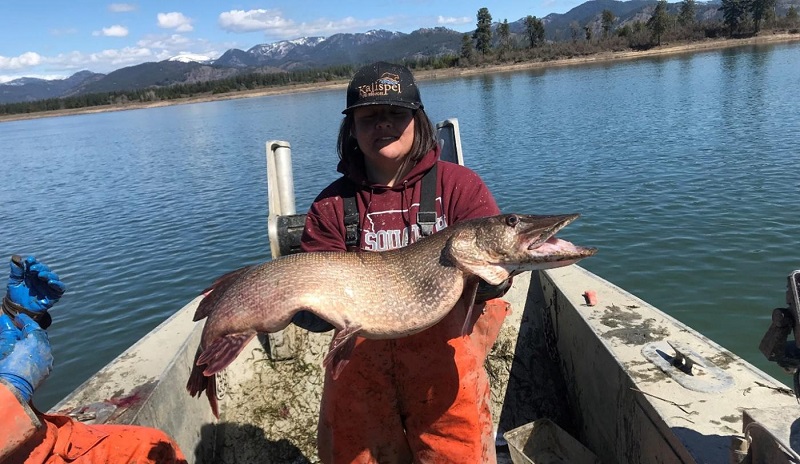
Photo of Northern Pike captured during suppression efforts in the Pend Oreille River, WA. (Kalispel Tribe Natural Resources Dept.)
Northern Pike (NP; Esox lucius) are an apex predator fish species native to the mid-western United States, parts of Alaska, and the Saskatchewan River drainage in Montana. Tribes in the Northwest region have historically relied upon native Westslope cutthroat trout, bull trout, salmonids, White Sturgeon, Burbot, minnows and suckers for cultural and subsistence needs. When introduced to non-native waters, NP are highly invasive and significantly reduce these prey fish densities. Studies have revealed that NP were introduced in the Coeur d'Alene Basin in Idaho as early as the 1970s. Northern Pike suppression methods performed by the Coeur d'Alene Tribe (CDA) Tribe have included radio telemetry to evaluate NP seasonal movements and mark-recapture efforts to estimate the abundance of NP.

Northern Pike Reward Program Drop off Station (Noisy Water gas station pictured).
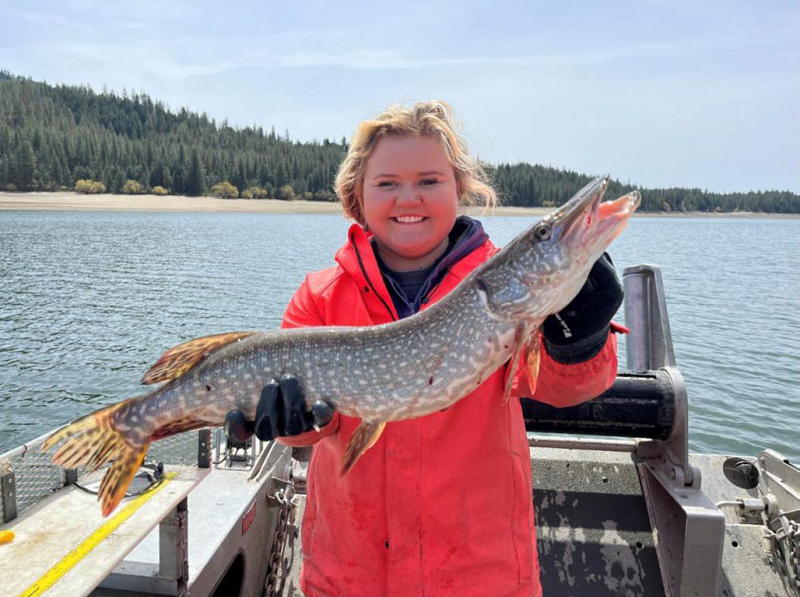
Northern Pike captured in Lake Roosevelt, March 27, 2023. (photo credit: Confederated Tribes of the Colville Reservation)
Other Tribes within the Northwest Region are also implementing NP removal and suppression methods. Columbia River Inter-Tribal Fish Commission (CRITFC) has focused on eDNA, paneled gillnet, and fyke net sampling within backwaters, sloughs, and railroad/highway lakes representing potential spawning and early rearing habitat for NP. In the event sampling results in the presence of NP, CRITFC initiates a regional rapid response eradication effort before these populations expand into other trust treaty resources. The use of eDNA monitoring is also utilized by the co-managers of the Lake Roosevelt Watershed, which includes portions of the Columbia River. Serving as co-managers, the Confederated Tribes of the Coville Reservation (CTCR), Spokane Tribe of Indians (STI), and Washington Department of Fish & Wildlife use a multi-tiered approach that also includes mechanical removal techniques (gillnets, seine nets, fyke nets, boat electrofishing), and angler incentives such as a Northern Pike Reward Program.
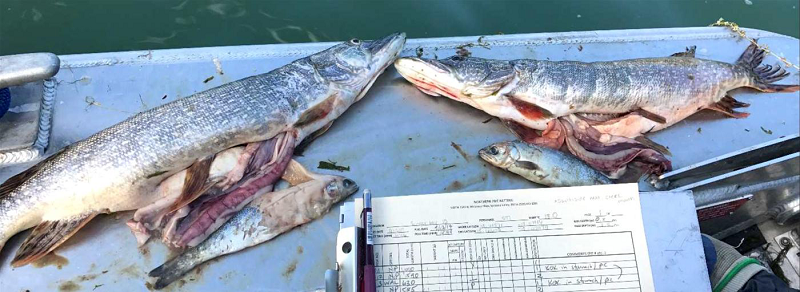
Northern Pike observed with consumed salmonids in Lake Roosevelt, WA (Photo credit: Spokane Tribal Fisheries, Spokane Tribe of Indians).
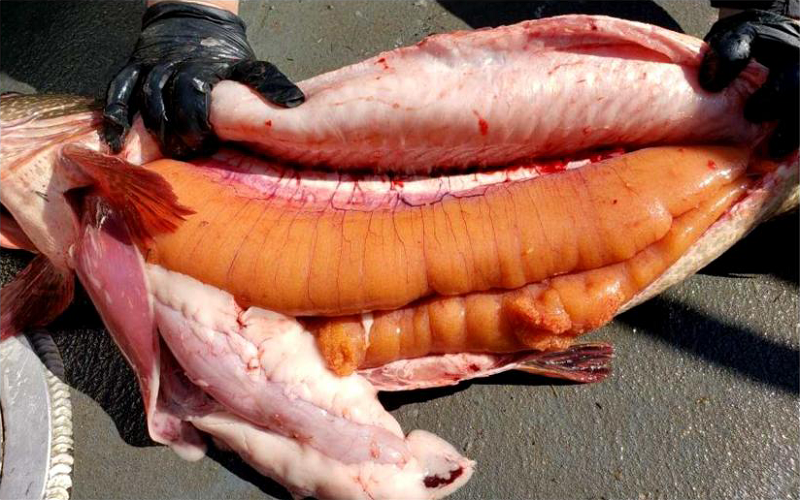
Gravid female Northern Pike showing fecundity of a single mature individual, Lake Roosevelt, WA (Photo credit: Spokane Tribal Fisheries, Spokane Tribe of Indians).
As of August 31, 2023, anglers within the Colville Reservation turned in 45 NP heads for a payout of $1,145. CTCR and STI reported a total of 19,579 NP removed from Lake Roosevelt between 2015 and 2023. The Kalispel Tribe's Natural Resources Department (KNRD) also prioritizes NP suppression within the Columbia River through their Northern Pike Suppression and Management Project. KNRD conducts annual suppression efforts in Box Canyon and Boundary reservoirs of the Pend Oreille River, a tributary of the Columbia River. Through mechanical removal practices, KNRD has removed a total of 19,613 NP in Box Canyon Reservoir between 2012 and 2023.
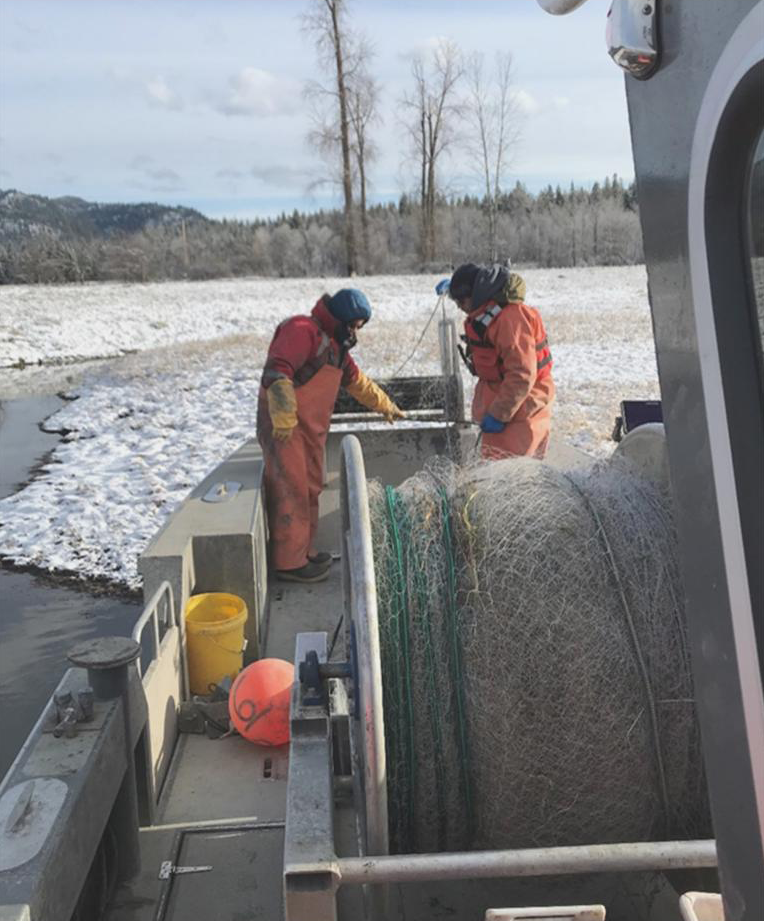
Gillnets being deployed during Northern Pike suppression efforts in the Pende Oreille River, WA (Photo credit: Kalispel Natural Resources Department, Kalispel Tribe of Indians).
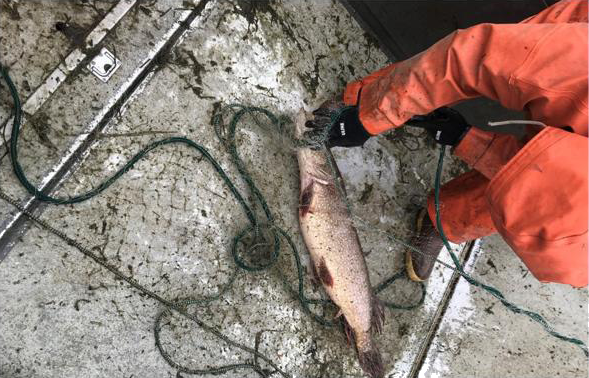
Northern Pike removal from a gillnet set during suppression efforts in the Pend Oreille River, WA (Photo credit: Kalispel Natural Resources Department, Kalispel Tribe of Indians).
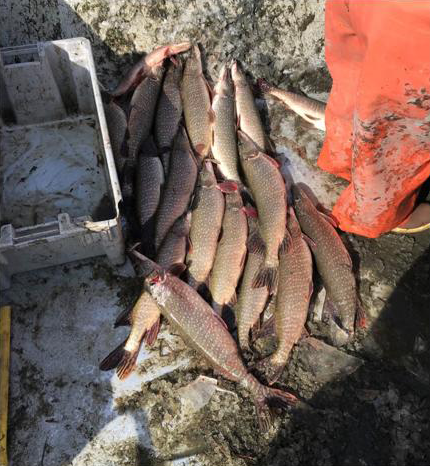
Northern Pike captured during suppression efforts in the Pend Oreille River, WA (Photo credit: Kalispel Natural Resources Department, Kalispel Tribe of Indians).
Regional Contact Information
| Region | Contact Name | |
|---|---|---|
| Alaska | Rosalie Debenham, Fish and Wildlife Biologist | rosalie.debenham@bia.gov |
| Eastern | Mikail Kane, Natural Resources Specialist | mikail.kane@bia.gov |
| Eastern Oklahoma | Justin Morgan | justin.morgan@bia.gov |
| Great Plains | Todd Hauge | hauge.todd@bia.gov |
| Midwest | Drew Becker, Regional Branch Chief of Fish, Wildlife, and Parks | drew.becker@bia.gov |
| Navajo | Delores Becenti, Regional Geospatial Coordinator | delores.becenti@bia.gov |
| Northwest | Robert Compton, Rangeland Management Specialist | robert.compton@bia.gov |
| Pacific | Peter DeJongh, Regional Biologist | peter.dejongh@bia.gov |
| Rocky Mountain | Frank (Desi) Rollefson, Wildlife Biologist | frank.rollefson@bia.gov |
| Southern Plains | Michael Hardsaw | michael.hardsaw@bi.gov |
| Southwest | D. Chris Kitcheyan, Regional Biologist | david.kitcheyan@bia.gov |
| Western | Catherine Wilson | catherine.wilson@bia.gov |
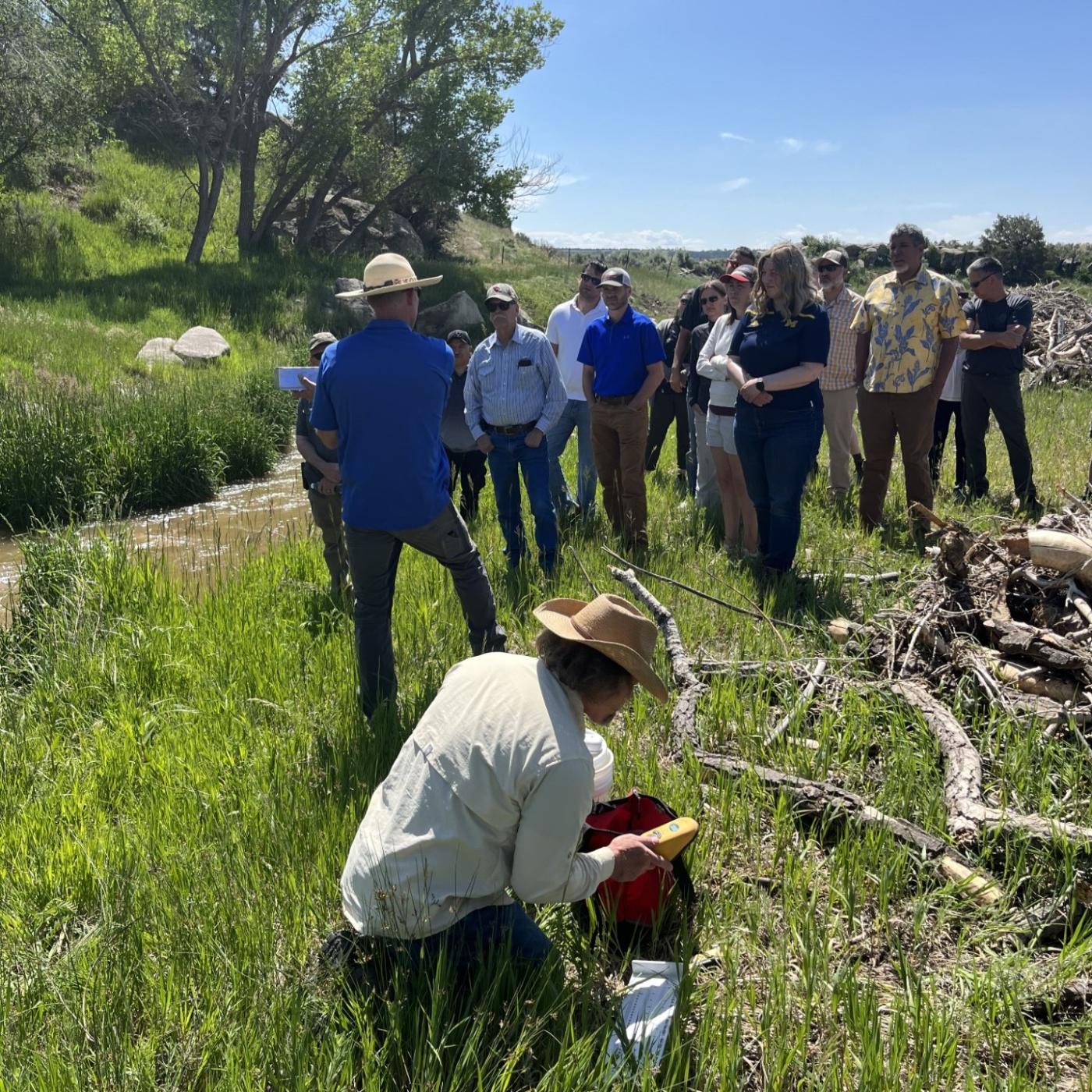
Additional Information
Related Pages
Contact Us
Albuquerque, NM 87104


